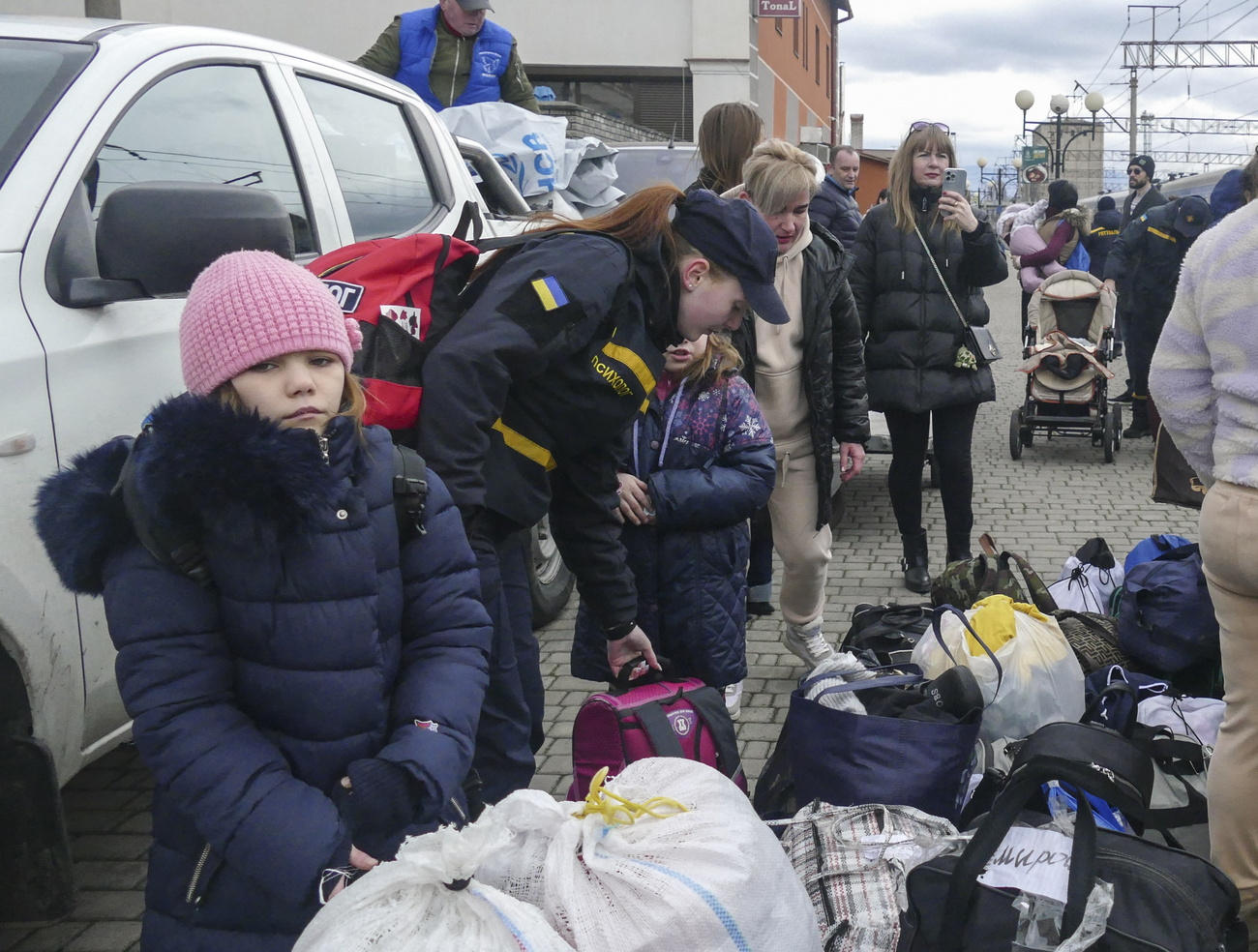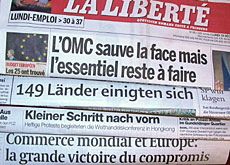
Press hails WTO compromise but not outcome

The Swiss press is heartened by the fact that a compromise was reached at world trade talks in Hong Kong, but the outcome has won fewer plaudits.
Under the agreement, accepted by the World Trade Organization’s 149 members, agricultural subsidies will disappear by 2013. But there was no progress on cutting tariffs for services and industry.
After six days of negotiations, the eleventh-hour deal hammered together by the WTO ministerial conference is assessed on the front pages.
The trade accord, which brings a binding global trade treaty one step closer, eliminates farm export subsidies by 2013 and makes modest cuts in other trade barriers, while leaving many contentious issues for later.
It falls far short of the ambitious deal that WTO negotiators had originally hoped for from Hong Kong: a detailed set of formulas for cutting farm and industrial tariffs and subsidies.
Towards that end, the text set April 30, 2006 as a new deadline to work out those details, required if the WTO is to set a global trade treaty by the end of next year.
Just a step
Compromise is the key word in both the German and French-speaking Swiss press, with some commentators more enthusiastic than others about the significance of the breakthrough.
In its editorial, the Bern-based Der Bund newspaper points out that Hong Kong was just a step and that more tough negotiations lie ahead.
It also highlights the “power shift” that has taken place in world trade politics, with the developing countries, led by Brazil and India, emerging as the new forces.
“This power shift means that Switzerland will play a less important role in future world trade politics. From now on the important decisions will be taken by the US, the EU and the developing countries.”
Although the developing nations did not achieve all their goals in this round of liberalisation, they can no longer be disregarded in the WTO, the paper notes.
“In this sense the Doha round has been a ‘development round’– even if the Swiss NGOs represented in Hong Kong do not want to see it like this.”
As for the prospects of a successful conclusion to the Doha round of talks, which kicked off in 2001, Zurich’s Neue Zürcher Zeitung admits that it wouldn’t place any bets on this happening by the 2006 deadline.
No miracles
Geneva’s Le Temps ties the story in with the European Union (EU) budget under the headline, “World Trade and Europe: the great victory of compromise”.
“Of course … the fundamental reforms and visionary decisions have been left until later. … the negotiators [EU and WTO] did not work miracles. But with the timing of their agreements, they have moved forward to saving something critical – multilateralism,” it wrote.
The French-language daily points out that this round of talks was among the most difficult negotiations ever undertaken. “In an enormous bartering of vital interests, at stake for each of the 149 countries are its prosperity and jobs.”
Lausanne’s 24 Heures injects the subject with plenty of drama, beginning with the headline – “2013, the odyssey of the WTO”. In its editorial, the paper says that these last-minute deals have become something a habit in the WTO.
“In the space of a night, the last before the fall of the curtain, a final compromise emerges like a miracle from the ministers’ hat.”
24 Heures ties the story up with a fitting Swiss metaphor. “The meagre results obtained during six days of negotiations will at least allow the WTO train, which is still searching for its final destination, to get back on the rails of the Doha round.”
Meanwhile Zurich-based daily Tages Anzeiger evokes some of the atmosphere of the talks in Hong Kong, describing how some of the faces of the protagonists looked old after the six days of negotiations. “One could read not only tiredness but also disappointment on their faces.”
The sixth ministerial conference of the WTO took place from December 13 to 18 in Hong Kong.
The meeting of the organisation’s highest decision-making body was intended to lead to the conclusion of the so-called Doha round of trade talks, launched in 2001.
Economics Minister Joseph Deiss led the Swiss delegation and hailed the meeting a success.
Ministers have approved a text that eliminates farm export subsidies by 2013.
Developed countries have committed themselves from 2008 to importing – without customs legislation or quotas – 97 per cent of products from the least advanced nations.

In compliance with the JTI standards
More: SWI swissinfo.ch certified by the Journalism Trust Initiative




























You can find an overview of ongoing debates with our journalists here . Please join us!
If you want to start a conversation about a topic raised in this article or want to report factual errors, email us at english@swissinfo.ch.